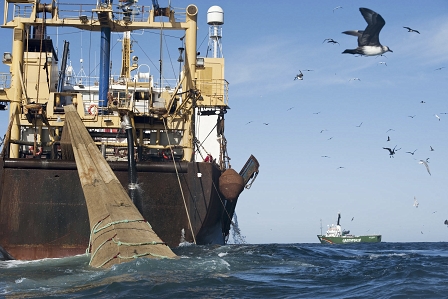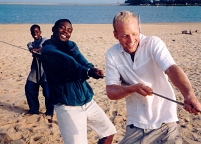Erstellt am: 6. 5. 2011 - 13:38 Uhr
The David and Goliath Battle For African Fish
Harouna Ismael Lebaye, a 43-year old fisherman from Mauritania, says he rues the day that the big boats from Europe started turning up off the coast of his West African country and, as he describes it, depleting the marine resources that had nourished his coastal community for decades. The waters off West Africa have been called one of the last great fishing grounds on Earth. Although like much of the world’s oceans, they are already badly depleted, they have been traditionally been able to support thousands of artisanal fishermen using open-decked boats called pirogues.
"After the arrival of the European boats our productivity has declined day by day," he told me. "We used to spend half a day at sea to catch the amount of fish we needed to fulfill our needs, now it is often ten to fourteen days. We have to take more risks and go further from the coast. But still our productivity declines."

Christian Aslund
Two weeks at sea is no joke for fishermen like Harouna Ismael. I once spent half an hour on one of these rickety pirogues, in Ghana. We were never out of sight of the Gulf of Guinea, and it was enough to scare me. The pirogues, which are typically between 8 and 10 metres long, are buffeted by the waves and very dangerous in storms. The pirogues are dwarfed by the foreign ships that are competing for the fish. The factory trawlers flying the flags of European Union members are often over a hundred metres long.
These "floating football fields" are equipped with state-of-the-art technology, explains Anje Helms of Greenpeace, which allows them to follow the shoals and "hoover them up" with startling efficiency, then to store them in massive refrigeration vats before whisking them off to the ports of the European Union, the world’s largest market for fishery products.
The local fishermen can see the lights of their giant rivals from their beach-side shacks. It must be a disheartening sight. The race for West African fish seems like the classic David and Goliath battle but this time Goliath is winning. Greenpeace estimates that at least 235,000 tonnes of fish are caught in the waters of Mauritania and neighbouring Morocco every year. As Greenpeace puts it "In one day, these behemoth vessels can capture the same amount of fish as thirty or forty traditional pirogue boats would catch in one year."
Mauritania's own ministry of fisheries has estimated that the European trawlers take over 20 times more fish from the country's waters than the pirogues.

Christian Aslund
The law is on Goliath’s side. This plundering of African marine resources is mostly legal and subsidized by us - the European taxpayers. European fishing grounds have been severely overfished for decades and now the Europe Union, the biggest market in the world, gets an estimated quarter of a catch in foreign seas by signing Fisheries Partnership Agreements with developing countries like Mauritania.
These "cash for access" deals allow European boats to fish the waters in exchange for multi-million dollar payments, which, in principle, should be used to encourage sustainable development benefitting the coastal communities. Greenpeace says that each year EU taxpayers contribute €158 million directly to other countries to secure access to their waters and - at about "half a million Euros per vessel per year."
But Mauritanian fisherman Harouna Ismael says his community, which is suffering the economic slap-in-the-face of reduced catches, isn’t seeing this money that is supposed to be boosting his community. He suggests it has been siphoned off by the Mauritanian government to be used for other national priorities such as agriculture. In a report called To Draw the Line, the Swedish Society for Nature Conservation (SSNC) has criticized that there are no checks and balances to make sure the European taxpayers’ money reaches its intended destination. The SSNC’s Kajsa Garpe reported that "in three out of four countries we found no evidence that money was being spent on the development of local fisheries management. Fish workers and coastal communities do not see any benefits of these agreements whatsoever."
According to Greenpeace our tax money is not being used to fund development but rather to "fuel the short-term profits of foreign companies at the expense of the environment."
It is not surprising that the governments of developing countries are easily seduced into selling off their fishing rights but economists have pointed out that the trickle-down effects of Europe’s involvement is minimal. The fish are processed on board these factory boats from Europe and taken off directly to the European market. There is no incentive, for example, for processing and cannery industries to sprout up along the coast in Africa. Once again Africa is being prized for its raw materials and little else.
A Martime Eden : Saving our oceans - how a treasure trove of marine biodiversity has been cordoned off from industry.
Conservationists say the policy is not just economically damaging for African fishers, but also ecologically destructive for African marine life. Mauritanian marine researchers say the traditional artisanal fishing is more ecologically friendly because the local fishermen are selective about what they catch, whereas the European trawlers take everything - before discarding much of the catch. They complain that the government didn’t consult them before signing the deals with Europe and that the trawlers are causing the destruction of marine ecosystems.
According to Mikael Karlsson, President of SSNC, "the risk of an ecological disaster is imminent. The EU is literally taking the food out of the hands of the local people. Depleted fish stocks may never recover and the EU is contributing to a situation where millions of people will have to seek new livelihoods elsewhere."
_body_small.jpg)
Christian Aslund
It says the EU should only be able to sign new fishing agreements with developing countries if there is a scientifically proven surplus of fish which would be fished sustainably. They are calling for "scientific sustainability impact assessments" before each agreement is signed.
Not every country in West Africa has signed deals with Europe. Senegal has tried protected its waters to support its own fishing fleet, but Senegalese fisherman Ameth says the foreign boats still get the big catches. "It’s true there is no agreement but still these boats fish our Senegalese waters. Our resources are dwindling and our catches have got smaller since the arrival of these boats." Ameth, who is now 39 years old, has fished his entire life using traditional seines nets, where a team uses long flat nets like a fence to encircle the fish close to shore. Fishing is his sole source of income. He says the impact has been particularly damaging because fishing is essential for the survival and the soul of his village. For the coastal communities it’s our source of life," he says.
_body.jpg)
Christian Aslund
It would be unfair to blame the situation entirely on policies hammered out in Brussels. Europe is the biggest licensee in the region, but Japan, China, Russia have all signed ‘cash for access’ deals. And then there is the added challenge of illegal "pirate fishing". A 2009 Sunday Times report estimated the cost of the illegal catch in sub-Saharan Africa at $1 billion. Last month, for example, European authorities impounded 1,100 tonnes of fish on three refrigeration vessels docked in the Canary Islands following allegations they were caught off West Africa. The boats were owned and flagged to South Korea, Panama and China. But that doesn’t necessarily absolve Europeans of responsibility since the illegal "laundered" fish often lands on our plates. The catch was destined for the kitchens and dining rooms of Europe. It’s our insatiable appetite for fish that driving the depletion of the West African marine life.

chris cummins
How should the European Union react? As journalist Fred Pearce, who has visited to fishing communities of Mauritania has put it "the Europeans and other foreign fishing fleets should fish less and give more." The WWF says the EU should only be able to sign new fishing agreements with developing countries if there is a scientifically proven surplus of fish which would be fished sustainably. It is calling for "scientific sustainability impact assessments" before each agreement is signed.
The Common Fisheries Policy (CFP) is up for review in a long process which will begin this June at the European Parliament. Our representatives now have the chance to amend some of the problems. The lobbying battle has begun in earnest, with fishing industry representatives, fearful of job losses, up against a broad coalition of conservationists. Greenpeace hopes the politicians will also listen to the voices of the African fishermen and that’s why the group has invited Harouna Ismael and his Senegalese colleague Ameth Wade to Europe to tell their stories. On the 27th of April the pair met EU fisheries commissioner Maria Damanaki.
Harouna Isamel says that he is confident that the politicians in Brussels will take his concerns seriously but he adds that it is equally important that European tax payers understand the situation. "I hope that the conscience of Europeans will be pricked", says Harouna Ismael, "because they don’t want to subsidize a policy that destroys other people’s lives."


